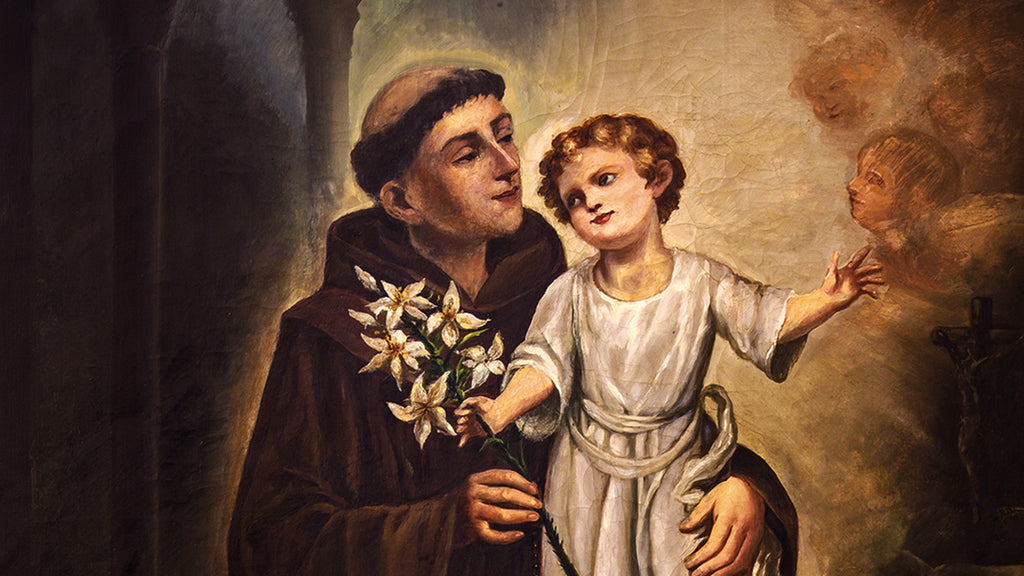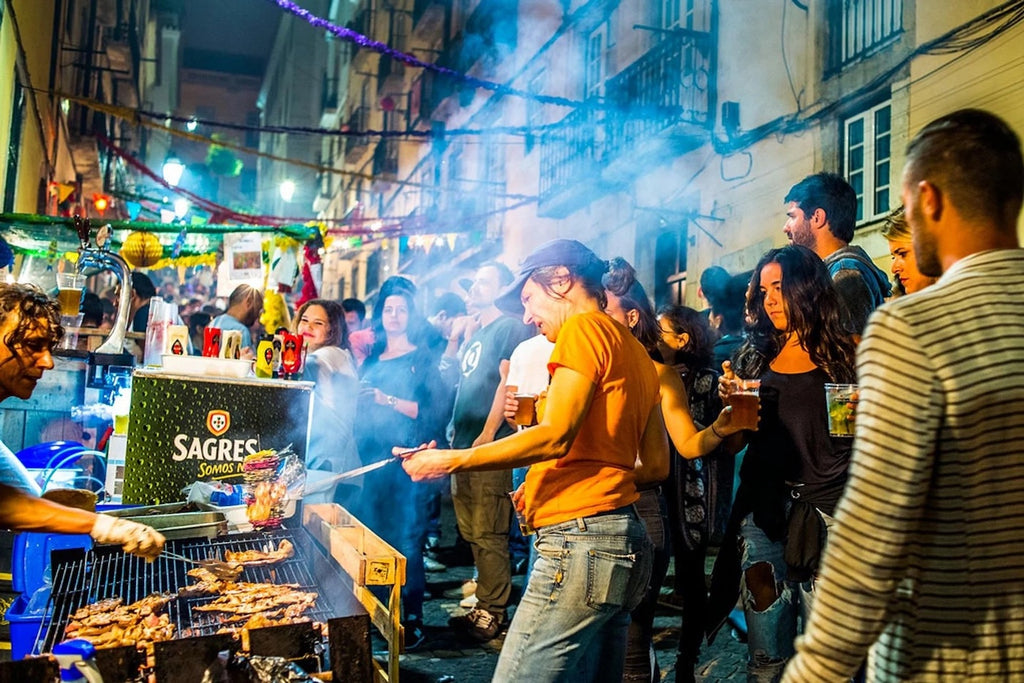Portugal has 13 national and official holidays plus a regional holiday in honor of theSaint of each city.
So, what are these holidays? What are the remarkable commemorations and what are the traditions?
January 1st : Ano Novo
National holiday of course. In Portugal, as in many countries, everyone expresses their wishes for the New Year and tries, by all means, to attract luck. The traditions are then the following:

December 31, Trade Square, Lisbon
- Eating 12 grapes with each of the 12 strokes of midnight expresses 12 wishes that will come true.
- Jumping from a chair and landing on the right foot symbolizes the beginning of the new year with good luck.
- Spending the first stroke of midnight with money in your hand, pocket or shoes will attract an abundance of money for the next year.
- Wearing new blue underwear will bring good luck for the next year.
- Banging pots and pans on the window, smashing plates to make noise and create chaos will purify and repel anything negative for the next year.
New Year's Eve is also the occasion to share a festive meal with family and friends. On this occasion, the famous Portuguese desserts are obviously part of the party. Discover the 13 most famous Portuguese desserts (and their recipes) in this other article

February 14th : Dia dos Namorados
Dia dos Namorados is a day celebrated in Portugal but not a public holiday. It is a day when couples and lovers celebrate the union of love. This day is celebrated in Portugal but is not a public holiday.
The customs related to this day originated in Rome. On February 14, fertility was celebrated by honoring Juno (goddess of women and marriage) and Pan (god of nature). It is in the Middle Ages that this day is associated with love and romance and that we begin to celebrate Valentine's day.

Lenco dos namorados - Credit descobrir Portugal
Bishop Valentin celebrated marriages despite the Emperor's prohibition. Sentenced to death, he miraculously gave back his sight to his jailer's daughter. Before his execution, on February 14, she wrote him a farewell message that she signed "Your Valentine". Valentine's Day was born but it was not until the 19th century that this practice spread throughout the world.
In the 18th century appeared in Portugal, in Minho, the tradition of lenços namorar : Pieces of linen or cotton fabric embroidered with floral motifs, symbols and love messages. The embroiderers declared their love by sending the handkerchief to their beloved. If he wore it in public, it was a sign that the love was mutual and that the courtship could begin.
These colorful patterns have become part of the Portuguese popular heritage and are used on many objects.

Wall swallow in ceramic Namorados - Collection Luisa Paixão
February 28th : Carnaval
Regional and optional holiday in Portugal, from north to south, on the mainland and on the islands, Portugal has many festivals and customs at this time of year.

Carnival of Loulé - Credit eurodicas
Since ancient times, in the north of Portugal, the Celtic peoples marked the end of winter with fertility festivals. Over the centuries, the pagan traditions of revelry, games, parties and dances in Portugal became so popular that it was impossible to fight them.
When the Pope recognized Carnival and the Catholic Church adopted it into the Christian calendar in the 15th century, festivals became increasingly common throughout Europe. Carnival officially became a time to eat meat and indulge before the fasting of Lent until Easter.

Torres Vedras carnival - Credit recordeuropa
With the blessing of the Church, from the 18th and 19th centuries, the upper classes of Portugal also began to organize their private balls. Then the Portuguese organized their first carnival parades in the streets, with floats, music and costumes.
April 15th : Sexta-feira Santa
A national holiday, Sexta-feira Santa or Good Friday is celebrated on the Friday before Easter Sunday. It marks the day of the crucifixion and death of Jesus Christ.
In Portugal, a country with a strong Catholic tradition, the rule on this day is abstinence from meat, in respect of Christ's sacrifice on the cross. Also, at 3pm, a minute of silence is observed for the crucifixion of Christ. Some companies or municipalities then set off an alarm to signal the moment of the death of Jesus Christ.

Holy Week procession in Obidos - Credit Turismo centro Portugal
On the night of Good Friday, the Church performs the Way of the Cross, a prayer designed to lead Christians to meditate on the passion, death and resurrection of Christ.
April 17th : Páscoa
National holiday of course. Easter is the most important holiday for Catholics who commemorate the resurrection of Jesus. Portugal being a deeply Catholic country, the Portuguese respect this tradition.
Easter traditions in Portugal are marked by processions, theatrical performances, festivities and lots of food. But there are also very specific customs particular to each region.
Throughout the country, it is customary for godparents to give gifts to their godchildren. For those who follow the Catholic tradition, it is traditional to offer the "folar", which symbolizes abundance after the fasting period of Lent.

Folar transmontano - Credit Vortex
But nowadays, it is common for godparents to offer a sponge cake, almonds, Easter eggs, various sweets, money, clothes and toys, depending on the age of the godchild.
In turn, the godchildren offer an olive branch to the godparents on Palm Sunday.
April 18th : Segunda-feira de Páscoa
Regional holiday in Portugal. Good Friday, the date that marks the death of Jesus Christ, is over. Also gone is Easter Sunday, with a family table usually filled with sweets. But there are many communities in Portugal where entire families take advantage of Easter Monday to breathe life into the demands of tradition. But beware, in Portugal, Monday is only a holiday if the municipality wishes it.
April 25th : Dia da Liberdade
National holiday, this date celebrates the uprising of the Portuguese military who, on April 25, 1974, carried out a military coup in order to end the dictatorship imposed by Salazar.

The movement of the armed forces, composed of soldiers who had participated in the colonial war, was supported by the Portuguese population. The army succeeded in deposing the President of Portugal, Marcelo Caetano, during the famous Carnation Revolution. Victorious, the April revolutionaries succeeded in establishing a democratic regime and the new Portuguese Constitution on April 25, 1976.
May 1st : Dia do Trabalhor
Workers' Day is celebrated every year on May 1st and is a public holiday in Portugal and in several European countries. It is not a worldwide holiday, although it is observed in several countries around the world.
The celebration of Labor Day dates back to May 1, 1886, in the United States, when more than 500,000 workers took to the streets of Chicago for a peaceful demonstration, demanding a reduction of the workday to eight hours. The repression was fierce and bloody, and disavowed by public opinion. In 1889, the International Workers' Congress, meeting in Paris, decreed May 1st as International Workers' Day.

In Portugal, May Day began to be celebrated in May 1974, after the revolution of April 25. The demonstrations, marches, celebrations and rallies organized on this date were aimed at presenting the workers' demands to the government and employers.
May 26th : Quinta-feira da Ascensão
A regional holiday, Ascension Thursday is a religious festival celebrating the ascension of Jesus into heaven, 40 days after he was crucified and resurrected.
The tradition in Portugal on this day is to gather an ear of wheat, an olive branch and flowers from the fields in a bouquet that is hung in the house and will remain there until the following year.

The ear of wheat symbolizes the food never lacks, the olive branch symbolizes peace and the flowers symbolize happiness.
June 10th : Dia de Portugal
National holiday, on this day all Portugal celebrates the Nation, the Portuguese communities and Camões, the famous Portuguese poet.
The first reference to the festive character of June 10 dates back to 1880, when a royal decree proclaimed June 10 as a "National Holiday and Grand Gala" to commemorate the 300th anniversary of the hypothetical date of the death of Luís de Camões. However, it was not until 1919 that June 10 became a public holiday.
The commemorations usually include various military ceremonies, exhibitions, concerts, parades and processions, as well as a decoration ceremony performed by the President of the Republic.
Each year, the President of the Portuguese Republic chooses a city to host the official commemorations. In 2016, the official commemorations were held for the first time in two cities at the same time: Lisbon and Paris and for the first time outside the country. Next will be Brazil in 2017, the United States in 2018 and Cape Verde in 2019.
Luís Vaz de Camões, is a Portuguese poet, born around 1525 and died in 1580 in Lisbon. Camoës is the object of a real cult in Portugal, so much so that the day of his death has become the Portuguese national holiday. Lovers of the Letters like to compare him to Virgil, Dante or Shakspeare. If you want to know more about Camões, please check out our
blog post "11 famous Portuguese people you've heard of".
June 13th : Dia de santo António
Regional holiday. Fernando Martins de Bulhões, born in 1195 in Lisbon, died on June 13 at the age of 36. He was canonized the following year, being credited with 40 miraculous cures.

In the 15th century, the Portuguese emphasized his birth in Portugal, making him known throughout the world at the time of the great discoveries. They made him the Patron Saint of Portugal and more particularly of Lisbon, his birthplace.
Since then, he is honored and celebrated every year throughout Portugal and June 13, the anniversary of his birth, is a public holiday in Lisbon.

Saint Anthony, patron saint of the city of Lisbon, is the object of a real devotion in Portugal and it frequently happens that the Portuguese ask for his help. They also represent him in faience icons, on the famous azulejos...

Saint Anthony scented statuette - Luisa Paixão Collection
June 16th : Corpo de Deus
National holiday in Portugal, celebrated every year on the 2nd Thursday after Pentecost Sunday, thus between May 21 and June 24. In 2013, the Portuguese government abolished the holiday corresponding to Corpo de Deus but reinstated it in 2016.

Procession Corpo de Deus in Lisbon 2019 - Credit ecclesia
Corpus Christi or Corpo de Deus is a Catholic holiday that celebrates the mystery of the Eucharist, the sacrament of the body and blood of Jesus Christ.
It is the day of processions and religious festivals in various parts of the country. On this day, it is also common for the Church to celebrate First and Solemn Communions.
June 24th : Dia de São João
A regional holiday, St. John's Day is celebrated on June 24. St. John is, like St. Anthony and St. Peter, a popular saint widely celebrated in Portugal. Known as the patron saint of married people and the sick, he is the saint who baptized Jesus Christ.
St. John's Day is celebrated in several Portuguese localities, but the city where the festivities are most prominent is Porto, where June 24 is a municipal holiday.

The festivities are concentrated in the historic area of Porto, with thousands of people strolling through the streets and watching the fireworks along the Douro River, on the banks of Porto and Vila Nova de Gaia. The São João festivities program is extensive, covering dozens of activities that take place over about a month.

On Saint John's Day, it is traditional to offer a jar of marjoram to one's fiancée, wife or lover. To this pot is usually associated a small flag with a popular verse referring to love.
If you can't go to Porto and respect this tradition, you can offer a marjoram pot made of earthenware with a flag and a popular verse. Just click on the image below.

June 29th : dia de São Pedro
A regional holiday, Saint Peter's Day is celebrated in Portugal on June 29. Like St. John and St. Anthony, St. Peter is a popular and much appreciated saint.
On this day, processions, balls and popular marches are organized in the streets and music is always present. In terms of gastronomy, grilled sardines, pepper, broa, caldo verde and wine are the main elements of the feast.

Some cities celebrate their municipal festival on St. Peter's Day, for example: Póvoa de Varzim, Sintra, Montijo, Évora, Castro Verde, São Pedro do Sul...
São Pedro is the subject of many representations in Portugal. He is a popular saint, familiar to the Portuguese who sometimes represent him in a burlesque way like Julia Côta who shapes clay, naively, representing what she sees around her.

August 15th : Assunção de Maria
A national holiday, the Assumption of the Virgin into Heaven is celebrated each year on August 15. Catholic tradition states that at the moment of her death, the Virgin Mary was transported in body and soul to heaven to share in the glory of her son, Jesus Christ.
This day of the Assumption of the Virgin is a holiday in Portugal and unlike other religious holidays that may have been suppressed under the Dictatorship of Salazar, this one has always been maintained. Indeed, the Virgin is considered the Queen of Portugal and is linked to the main events in the history of Portuguese independence.
In Portugal, on August 15, pilgrimages and religious festivals are celebrated in various localities. It is an important festival in the Church. The mass of this day makes special reference to the mother of all Christians, from the homily to the prayers dedicated to the Saint.
October 5th : Implantação da República
National holiday in Portugal, October 5 commemorates the proclamation of the Portuguese Republic on October 5, 1910.
The Portuguese Republic is the result of a long process of political and social evolution that began in 1876 with the creation of the Republican Party, which was created with the aim of overthrowing the monarchical regime.
A British ultimatum addressed to Portugal, the expenses of the royal family, the power of the church, the political and social instability and the incapacity of the country to adapt to modernity constitute the foundations of the erosion of the Portuguese monarchy between 1876 and 1910.
In 1908, while returning to Lisbon from Vila Viçosa in the Alentejo, where they had spent the hunting season, King Carlos and Crown Prince Luís Filipe were assassinated in the middle of the Praça do Comércio. The monarchy was in agony.
On October 3, 1910, the republican revolt broke out. A few hundred Portuguese took up arms and occupied the Rotunda (Praça do Marquês de Pombal). The government did not react.

Revolutionaries occupying the Rotunda - Credit Noticias
On October 4, 2000 soldiers and sailors revolted, the army did not react. After refusing to leave Lisbon at first, King Manuel II and his advisors fled to the Palace of Mafra a few kilometers away.
On the night of October 4, the royalist troops confronted the insurgents of the Rotunda but an armistice was quickly signed under the pressure of the 2000 soldiers and sailors who threatened to disembark to confront the royalist troops.
In the morning, the people took to the streets, the royalist General handed over his command to General António Carvalhal, a Republican. At 9 a.m., the Republic was proclaimed by José Relvas, on the balcony of the Lisbon City Hall.

José Relvas, on the balcony of the Lisbon City Hall - Credit noticias
A provisional government headed by Teófilo Braga was appointed and ruled the country until the approval of the 1911 Constitution. With the establishment of the Republic, the national anthem, flag and currency were replaced.
November 1st : Todos os Santos
A national holiday, All Saints' Day is celebrated in the Catholic Church on November 1st. As its name indicates, it is a feast day in honor of all the saints, all the martyrs, of all times, known or not.
1er décembre : Restauração da Independêcia
National holiday in Portugal, December 1 commemorates the action of the Portuguese nobles who, on December 1, 1640, invaded the royal palace and killed Miguel de Vasconcelos, the Spanish representative in Lisbon, acclaiming João, Duke of Braganza, as King of Portugal, thus ending the Iberian Union between Portugal and Spain, which lasted 60 years.

Commemoration of the restoration of independence in Lisbon - Credit tveuropa.pt
Since then, the day of the restoration of independence is a day of commemoration in Portugal. From 2013, as part of a package of measures to increase productivity, the Portuguese government decided to abolish this day and then reinstated it in 2016.
December 8th : Imaculada Conceição
National holiday in Portugal, December 8 celebrates the life and virtue of the Virgin Mary, mother of Jesus, conceived without the mark of original sin, recognized as a Catholic dogma on December 8, 1854 giving rise to a commemoration.
In 1646, King John IV of Portugal, organizes a solemn ceremony in Vila Viçosa to thank the Virgin for the restoration of the independence of Portugal from Spain. He went to the church of Our Lady of the Conception, declaring her patroness and queen of Portugal. Since that day, no other Portuguese king has worn a crown on his head, a privilege that would only be available to the Immaculate Conception.
December 25th : Natal
National holiday, Natal begins with the Christmas Eve called "Consoada" and continues around the midnight mass called "la Missa do Galo" but Christmas is celebrated rather the following day, December 25.
This time, the dishes are more copious, less common. So we gather to enjoy oven-roasted kid served with "grelos" turnip shoots, "Leitão assado", roasted suckling pig.
If you want to discover the Christmas traditions in Portugal, check out our blog post "Christmas traditions in Portugal".






























